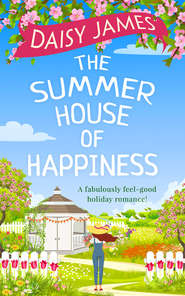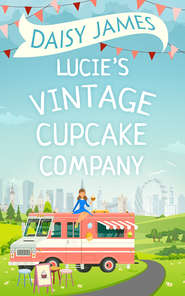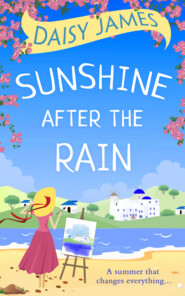По всем вопросам обращайтесь на: info@litportal.ru
(©) 2003-2024.
✖
If The Dress Fits: a delightfully uplifting romantic comedy!
Автор
Год написания книги
2019
Настройки чтения
Размер шрифта
Высота строк
Поля
Callie cast her eyes around the room. It wasn’t what she had been expecting at all. She had envisaged the boardroom of her aunt and uncle’s solicitor’s office to be lined with mahogany bookcases crammed with weighty, leather-bound, legalistic tomes and the faint smell of dusty parchment fighting for supremacy with the aroma of wax furniture polish like the venue – straight out of a Dickensian novel – that she had been forced to attend for the reading of her parents’ wills after the car crash. As she had been an only child, the contents of their last will and testament had held no surprises and she’d wondered at the time why the elderly solicitor had bothered with the charade.
Here she was, a scant fifteen years later, being invited to listen once again to the monotone drone of a probate lawyer as he read through the terms of her aunt’s will, but this time she sat, along with Seb and Dominic, in what was essentially a glass cube. The view from the window was spectacular, looking straight out onto The Stray, a large expanse of open parkland in the centre of Harrogate framed by a profusion of pink-flowering cherry trees.
Her aunt and uncle had adored the park so much they’d bought a house which overlooked it. Uncle John had often told her that in Victorian times it had been used as a racecourse, but more recently the area around The Stray had been declared one of the UK’s happiest places to live.
She dragged her attention back to the room, surprised to see that Mr Braithwaite was looking over his tortoiseshell spectacles at her with an expectant expression on his face. Seb and Dominic were smiling.
‘Erm, sorry, I was just admiring the view.’
‘Yes, Miss Henshaw, I have to agree with you, and it’s at its most beautiful this time of the year.’
She smiled back, but the silence continued.
‘What?’ she blurted out.
Seb got up and went to sit next to her. He took both her hands into his. ‘Mum has left her house here in Harrogate to me and Dom.’
Callie nodded, smiling into Seb’s kind brown eyes which reminded her so much of his mother that she had to quash the rising panic in her chest. Mr Braithwaite didn’t look like the type of lawyer who would appreciate females sobbing onto his smoked-glass conference table.
‘And she left Gingerberry Yarns to you, Cal.’
‘She… I beg your pardon?’
‘Dom and I knew she wanted you to have it. It was half your mum’s before she and your dad…well… And you did love the place, didn’t you, before you left to chase your fortune in London? You know, one of my earliest memories is of you designing and sewing your own clothes for your Sindy doll from remnants of fabric and ribbon. You even knitted jumpers for our teddy bears, remember? We’re not interested in the shop. Mum made the right decision.’
Callie knew her jaw had slackened. She flicked her eyes from Seb to Dominic and back again. The brothers nodded in unison.
‘Seb’s right, Cal. You adore that place. Whenever I go there it feels weird not to see you sitting at that huge table doing your homework. You spent every spare second there. Well, when you weren’t out gallivanting with Theo or watching his band crucify some of my favourite rock anthems,’ added Dominic.
‘Gingerberry Yarns is mine now?’
Her cousins nodded. The solicitor shuffled his papers back into the buff file in front of him, tied it with a green ribbon and rose from his chair.
‘I’ll leave you to your discussions. Please take your time and help yourself to coffee. If you need any advice about the disposal of either the property here in Harrogate or the shop on Allthorpe High Street, then my firm’s services are at your disposal.’
The door swung closed behind him.
‘But I can’t run a haberdashery shop in Yorkshire. I live in London. I have a business that devours every second of my time, perhaps even more if my prayers are answered.’
‘Mum was so excited about the wedding gown competition, you know. She told everyone who came into the shop about it.’ Seb’s eyes sparkled but he managed to hang on to his emotions. ‘Dom and I have already decided to sell Mum’s house. If you want to sell Gingerberry, you have our blessing. Lives move on, things change. We know that. Just promise to come and visit us up here in Yorkshire once in a while. We miss you.’
Callie couldn’t hold on any longer. She’d thought she had no tears left to shed yet a deluge burst from within.
‘I promise,’ she managed.
‘Oh, and before you go back down to London, why don’t you make your peace with Theo? Remember what Mum always used to say? Life’s too short to carry grudges. You know, I don’t have a single childhood memory that doesn’t feature you and Theo together in supporting roles.’
‘Seb…’
‘And perhaps, before you make any decisions, you should take a good look around the shop. Maybe take a few photos? It’ll bring back memories you thought you’d forgotten. It did for me and Dom.’
‘I will, yes. Thanks, Seb. Thanks, Dom. But, really, I can’t see any other alternative but to sell up.’
‘Whatever you decide, Cal, you have our full support.’
She would do as Seb had suggested. She’d go back to Allthorpe and spend an afternoon in the shop. It was the least she could do after such a generous gift from her Aunt Hannah. It would also be an ideal opportunity to check out the stock, to box up anything suitable for Callie-Louise.
Seb was right. She had left her life in Yorkshire behind and carved out a new one in the capital, although it was career-orientated with very little social life. She found herself yearning for the anonymity of London where the streets were filled with dull, grey office workers unconcerned about their fellow humans’ difficulties – in fact she had become one of them, a member of that overworked, harried tribe. In Allthorpe, on the other hand, everyone knew their neighbours’ business, happy or sad, and had a ready word of congratulation or solace to offer.
However, she did have a plethora of happy memories wrapped up in Gingerberry Yarns and it would be tough to leave them behind for good. Yet a stab of regret needled her conscience – there was one thing that pained her above all else.
If she did sell Gingerberry, what would happen to Delia?
Chapter Six (#ulink_a6aaee97-df96-58af-ac7a-b3eba1c78da0)
Callie paused in Allthorpe High Street to look up at the sign, fashioned from bronze in the shape of a ball of wool stabbed through with a pair of knitting needles. Gingerberry Yarns, it announced. She smiled despite her sadness as she recalled the day it had been delivered; first the shock, then the burst of hilarity her mum and Aunt Hannah had shared.
In a certain light, the signage looked just like a skull and crossbones. Would customers think they were pirates, Hannah had asked. Delia had been summonsed for her valued opinion, but after much deliberation over the big brown teapot, they had all declared they loved it and hung it outside the shop with tongue-in-cheek pride. It would be a talking point if nothing else. They’d christened its erection with a bottle of Prosecco rosé and a Victoria sponge cake filled with oodles of jam and cream from old Tom Wallington’s bakery on the corner.
Gingerberry Yarns had been closed for a week as a mark of respect after the passing of her aunt. Shading her eyes, she peered through the grime-coated window. The little shop still held a hint of magic for Callie – once inside the door, the visitor would be enveloped in a warm comfort blanket, safe, just for a few moments, from all the traumas life tossed in their path. She inserted the key Seb had given her and opened the door. The brass bell above her head reverberated with a jaunty chime of welcome but it jarred against Callie’s ragged nerves.
‘At last dear, it’s perishing out here. What kept you?’ Delia bustled in behind her, a rich aroma of warm baked croissants following in her wake and permeating the shop’s motionless air. ‘I’ll just butter these whilst they’re still warm. Young Tom Wallington really is proving to be a baking maestro. These croissants of his melt in your mouth. You should taste his cherry scones, Callie, but his cheese and rosemary versions are simply delicious, too. If you ask me, his talents are wasted in Allthorpe after all that training he did in Paris and at Betty’s, but, well, his father can’t…’ Delia’s prattling dropped off when she noticed Callie’s expression. ‘I’ll pop the kettle on. See you upstairs when you’re ready for a cuppa.’
Callie’s eyes followed Delia’s plump backside as she disappeared up the stairs to perform the same task she had done every morning for the last fifteen years, only this time for her best friend’s niece. She stepped further into the high-ceilinged room, memories crashing through her thoughts whilst she listened to the cheerful tinkling of cutlery and cups as Delia busied herself in the upstairs kitchen, one that was as familiar as her own.
Callie smoothed her palm over the glass-topped counter, its surface reflecting her pixie-like features and the misery swirling in the far corners of her soul. A wave of desolation rippled over her when she realised Gingerberry Yarns would never again be blessed with the smiling presence of its proprietor. The fact that the world could keep on turning despite this devastating knowledge annoyed her.
She cast her professional eye around the room. Her recent absence afforded her the opportunity to scrutinise its outmoded contents with a fresh perspective. What her eyes met instilled no creative enthusiasm. The place was old-fashioned and shabby at the edges. Why hadn’t she noticed this careworn façade before?
Puffs of dust and sadness hovered amongst the packed wicker baskets. Garlands of twisted yarn nestled in cubbyholes or behind glass doors with tiny brass knobs more befitting a gentleman’s outfitters from the fifties. The shop was well stocked but everything on the shelves depicted a bygone era when communities were tight and pockets tighter. It was a place you would find your granny holding court, not a young mothers’ chinwag or a teenagers’ coterie of gossip. But then, ‘Gran’s Woollen Emporium’ was exactly what Gingerberry Yarns was – an old people’s social club or a place for the knitting circle from the local WI to persuade their deft fingers to twirl yarn into garments for the needy.
Polished teak shelves ran round the remaining two sides of the room, stuffed with lurid, multicoloured acrylics Callie had last seen on Barbie. Where were the natural lamb’s wools, the organic silks, the fair-trade cottons? Even the Aran was synthetic.
Knitting needles had been jammed into spaghetti jars like forests of pasta. Cards of pearl buttons and other assorted fastenings dangled from racks of chipped steel. The sample garments displayed on coat hangers on old mahogany hat stands, clearly knitted by her aunt or Delia, to Callie’s trained eye resembled bed jackets for the terminally ill. There were so many trendy designs coming out of Scandinavia at the moment, inspired by the wave of crime fiction that had been serialised for television, and the art of knitting was now a celebrity-endorsed pastime. She thought of the chunky Danish sweaters Scarlet adored; hers was red and cream, a prized possession that had cost her well over four hundred pounds.
Her fertile designer’s mind drifted to the Kaffe Fassett designs, works of art every one of them, all sculpted in natural wools, if not organic or locally sourced. She remembered the ‘stitch and bitch’ sessions she had attended when a penniless student in Newcastle, where, for the price of a cup of coffee in the local Costa, she’d spent warm, aroma-filled evenings with a diverse gathering of friends, from eager teenagers to harassed new mums grabbing a couple of hours of sanity away from the baby, and even professional women escaping the testosterone-infused office for a more girly activity that would not be judged against the bottom line.
The shop sported the most magnificent glass-plate frontage with its title embossed in arched gold lettering. But the window was almost opaque with rain-streaked grime and its display of misshapen sweaters did not invite curious perusal by passing window-shoppers.
In the farthest corner of the room, behind the counter where Callie slumped, her elbow supporting her chin, Hannah and Delia had squeezed in an enormous antique mahogany table, complete with green leather inlay as wrinkled as an octogenarian’s knees; its tooled edges inlaid with gold leaf and the deep scratches testament to the passage of time. Around this monstrosity huddled a disconsolate selection of equally ancient hard-backed chairs. A couple sported chintzy cushions as a nod to the comfort of their users’ buttocks.
Clearly this was where the serious business of the day was conducted – just not the money-making kind. It seemed as though ghosts still lingered there, at the table, completing unfinished projects before they could rest in peace.
The whole store screamed warmth and comfort; a genteel, English lady’s boudoir of the 1950s. Its painted walls blistered and flaky to the touch, its flooring worn and patched. Places like Gingerberry Yarns would not have survived in the metropolises of Leeds and Manchester. They had been replaced by trendy wine bars and the ubiquitous coffee shops, estate agents and nail bars, although even these businesses were struggling now.
Callie glanced out of the front window to the row of shops across the road that mirrored theirs. Marietta’s Hairdressing Salon, its windows reflecting the golden glow of the mid-morning sun, displayed three giant black-and-white portraits of cutting-edge hair design. With the bakery producing fresh croissants, Callie wondered whether Gingerberry Yarns was the only shop on Allthorpe High Street that had not moved with the times.
As she straightened up, the realisation came to her with a jolt that slammed straight to her heart. Her aunt and Delia had run this compendium of yarns and ribbons over the years, not as a business, but as a social enterprise. A note of dread rang in the back of her mind for what she would discover in the accounts when she marketed the business. It was blatantly obvious from the noticeable voids on the shelves behind the gargantuan meeting table that very little had been spent on the shop’s maintenance. There was no point thinking about that, though, now the building and the business were going to be sold.











